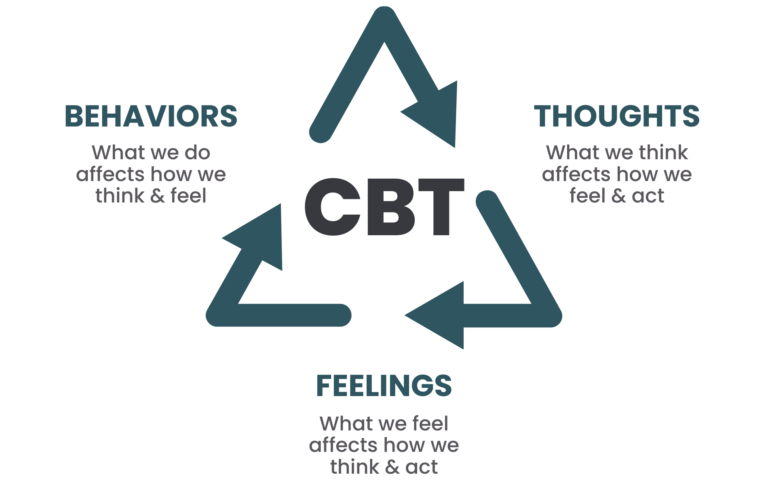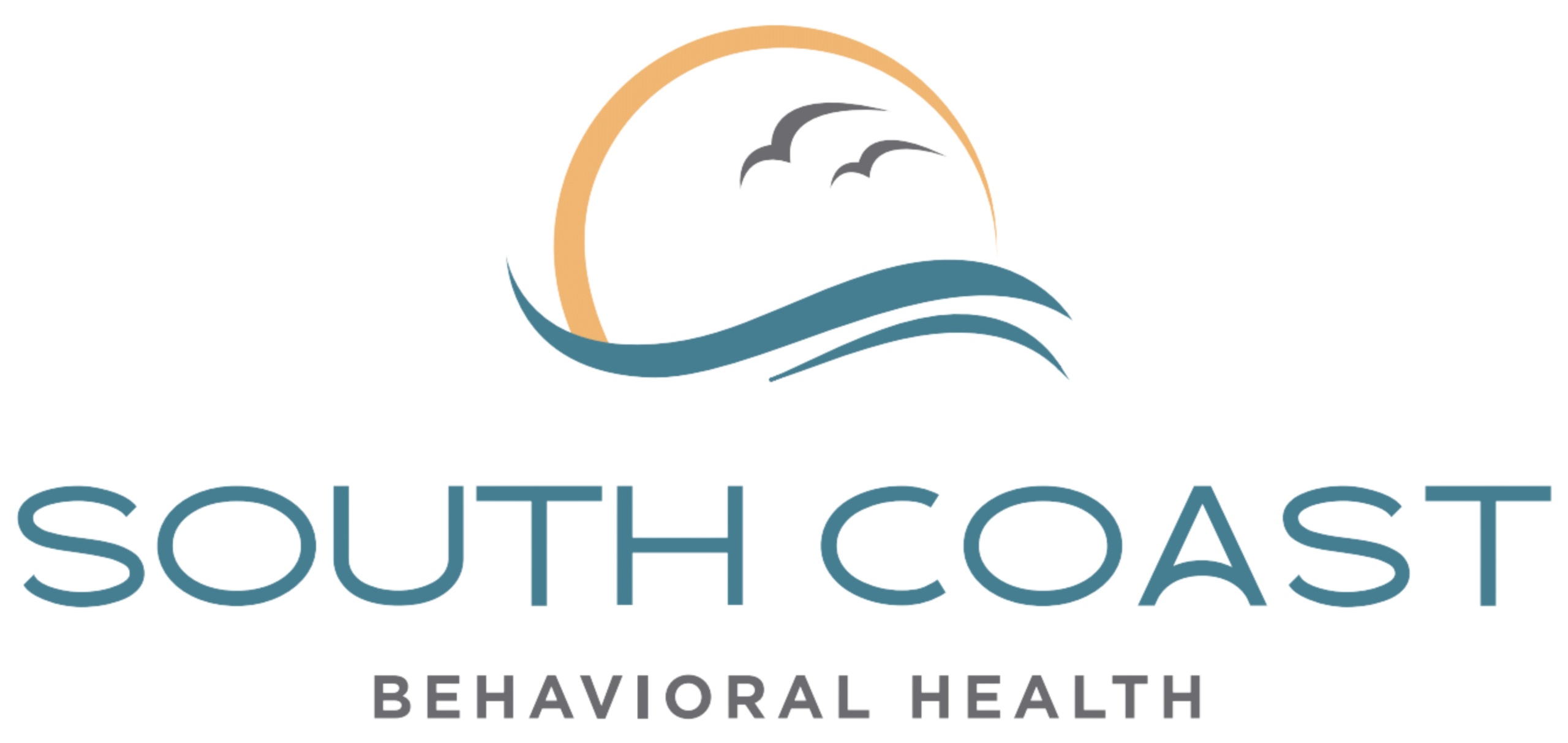Cognitive Behavioral Therapy
Cognitive behavioral therapy, or CBT, aims to help you manage mental health and substance use disorders. CBT operates under the belief that thoughts are the underlying cause of your emotions, actions, and behaviors. The main goal of CBT therapy is learning how to identify thought patterns as a means to jump-start change.
South Coast Behavioral Health offers CBT therapy as part of our evidence-based addiction treatment services to help you in your recovery journey. But what exactly is CBT and how can it help you in recovery? Let’s take a closer look.
What Is Cognitive Behavioral Therapy (CBT)?
Cognitive behavioral therapy (CBT) is a type of psychotherapy that helps individuals identify and challenge negative thoughts and behaviors while learning new skills to promote healthier ways of thinking. In general, cognitive behavioral therapy is based on the idea that our thoughts, behaviors, and emotions are all connected. As a staple in the field of addiction treatment and therapy, CBT is a research-backed method that benefits the treatment of a variety of mental health issues that negatively impact a person’s ability to function.
CBT can be conducted in individual or group settings. It typically involves weekly sessions lasting approximately 50 minutes each. During the session, the therapist and client discuss current issues and goals, while also addressing any underlying factors that may be contributing to these issues. To further support this process, CBT practitioners may assign homework or activities that can help individuals practice the skills learned in therapy.
During rehab, CBT can be used in combination with other strategies such as medication or lifestyle changes. Together, these comprehensive approaches can help you gain a greater understanding of the underlying causes of your addiction. Throughout treatment, CBT will teach you how to effectively manage triggers and cravings to maintain your sobriety and thrive in recovery.
How Does Cognitive Behavioral Therapy Work?
CBT is based on the premise that your thoughts, feelings, and behaviors are interconnected. For this reason, CBT therapists work with you to incorporate positive behaviors and ways of thinking. Therefore, by changing your thoughts and behaviors, you can change the way you feel.

Typically, cognitive behavioral therapy sessions last for 60 to 90 minutes. During CBT sessions, you will work with your therapist to identify negative thinking patterns and behaviors. Once these negative thought patterns are identified, you learn how to challenge and change them.
If you are struggling with negative thought patterns, you may also experience feelings of anxiety and depression. These feelings often result in behaviors like avoiding social situations and neglecting your responsibilities. In that case, you may turn to alcohol or drug abuse to numb those negative feelings.
During treatment, your CBT therapist helps you identify the underlying thought patterns that contribute to your substance abuse. Following this, your therapist will provide advice on how to challenge your thoughts. Your therapist will also teach you a coping strategy to help when faced with an anxiety-provoking situation or other negative emotions.
CBT Techniques
Knowledge of self, decisions, attitudes, grief, and acceptance are all common concepts that can affect your ability to resolve internal and external battles in your life. To effectively change your thoughts and behavior, it is important to understand how you think and what causes your negative behaviors.
In addiction treatment, therapists utilize CBT techniques to help clients develop healthier thought patterns and encourage positive change.
CBT techniques include:
- Identifying negative thoughts
- Instilling new coping skills
- Setting goals for improvement
- Practicing problem-solving
- Continuous self-monitoring
CBT therapy focuses on the relationship between thoughts, feelings, and behavior for clear and logic-based responses to stressors. Simply put, CBT techniques reduce negative emotional responses and alter behaviors. To do so, cognitive behavioral therapy uses cognition and rationale to undo negative thought patterns that fuel maladaptive coping mechanisms.
Because of its ability to create lasting change, CBT has been shown to be an effective treatment for a variety of mental health disorders and substance use disorders. The techniques for CBT have been proven effective for a range of mental health issues, including, but not limited to: anxiety, depression, anger management issues, personality disorders, and eating disorders.
Examples of CBT Techniques
Cognitive Reframing
Cognitive reframing helps you identify negative thought patterns by paying close attention to your internal reactions to stress. During CBT, your therapist will ask questions to help you catch unhealthy thoughts, challenge them, and change them to a healthier alternative.
Thought Records
Thought records help you keep a log of your thoughts to help you identify unhealthy patterns that occur in your daily life. Keeping a journal also helps you document your progress in recovery and acts as evidence that you are healing and growing, regardless of any doubt you may feel.
Guided Discovery
Guided discovery challenges your negative beliefs and expands your perspective. Your therapist poses questions to challenge your negative beliefs and false assumptions. For example, you may be asked to present evidence to support your thought process.
Psychoeducation
During CBT, psychoeducation groups teach you about the connection between thoughts, feelings, and behaviors and their impact on your well-being. When you understand the unhealthy core beliefs that influence unwanted behaviors, you can regain control of your mind and remove unhealthy thought patterns that influence addictive behaviors.
Behavioral Experiments
Behavioral experiments help you manage catastrophic thinking. Before participating in a stressful task, your therapist will ask you to share what you think will happen. In a follow-up session, you discuss whether or not your worse-case scenario happened. This helps you recognize that catastrophic events aren't as common as you once thought.
Activity Scheduling
Activity scheduling helps you face anxiety-inducing situations. By scheduling a clear date and time for activities that you tend to avoid, you remove the looming fear of missing a deadline or never completing a task. This CBT strategy also helps you to establish good habits and routines that can reduce your fears associated with the situation.
Successive Approximation
Successive approximation is a CBT technique that involves breaking an overwhelming task down into smaller, less daunting steps. As you check steps off the list, you build your self-confidence and trust in your ability to succeed.
Relaxation Techniques
Relaxation techniques help you learn practical coping skills to reduce your stress and increase your self-control. As you develop healthy stress reduction skills, you learn how to manage overwhelming emotions and self-soothe.
Role Playing
Role playing in CBT therapy helps you to prepare for stressful situations and improve your problem-solving abilities. In group therapy, role playing exercises also encourage you to consider the situation from another point of view.
What Happens During CBT Interventions?
During CBT interventions in treatment, you and your therapist have the space to discuss your thoughts, emotions, and behaviors. As you talk through your negative experiences, your therapist will prompt you with questions about your mindset.

For example, a CBT therapist may ask questions like:
- Do you think your self-esteem had any impact on your performance?
- What thoughts may have led to your pattern of procrastination?
- How did you feel when you were pulled aside to question your behavior?
- Do you think there is any connection between your drinking habits and your inability to manage your responsibilities?
While you contemplate these questions, you will begin to see the level of influence your negative thoughts have on your feelings and behaviors. As a result, your therapist will help you develop a better understanding of things like why your work performance suffered and how your alcohol use developed into an addiction.
In doing so, you build a greater sense of awareness of your current thought patterns and how they impact your decisions. Following this, you and your therapist will work to reframe your thoughts in a more positive way, which can encourage a healthier mindset and productive behaviors.
What Is The Goal of CBT?
The goal of CBT is for you to eventually become your own therapist. In other words, CBT teaches you how to identify negative thought patterns on your own and empowers you to work toward changing them. To do so, CBT therapists often use a variety of techniques to promote introspection, relaxation, self-acceptance, and inner motivation. During CBT sessions, your therapist will help you to identify the thoughts and beliefs that may be contributing to your negative patterns of behavior. Then, your therapist will continue working with you to replace these negative thoughts and beliefs with more positive ones.
For example, if you share that you’re always thinking “I can’t do anything right,” your therapist can help you to recognize that this is an unhelpful and untrue thought. After, the therapist will prompt you to replace the negative thought with something more constructive such as “I may make mistakes sometimes, but I am doing my best.”
By using CBT techniques, the client is able to manage their thoughts and behaviors more effectively and work towards achieving their goals. With the help of a qualified therapist, clients can learn to better manage difficult emotions and situations. This can ultimately lead to an improved quality of life and a greater sense of control over thoughts, emotions, and behaviors.
The Benefits of CBT for Addiction
CBT has been shown to be effective in treating a variety of mental health concerns, as well as a variety of issues, such as low self-esteem, fear, grief, trauma, and relationship problems. It can also help with habit management and impulse control issues seen in those with substance use disorders, OCD, or eating disorders.
One of the benefits of CBT is that the techniques are applicable to everyday life and can even help you reach your goals in treatment and long-term recovery. By routinely practicing CBT skills, you can begin to develop greater self-awareness and overcome maladaptive patterns of thinking and behavior.
For this reason, CBT is a beneficial form of therapy that can provide long-lasting results for individuals struggling with substance abuse and co-occurring mental health disorders. With the right therapist, clients can learn to recognize and change unhealthy thought patterns and behaviors that are contributing to their problems. As you progress through treatment, CBT can help you to find new ways of thinking and behaving that help you maintain your sobriety and create a fulfilling life in recovery.
Can CBT Therapy Help Me?
Cognitive behavioral therapy is a type of behavioral therapy that can be effective in treating a variety of mental health disorders. If you are struggling with any kind of mental health issue, CBT may be a good option for you to consider. From major depression to irritable bowel syndrome, CBT has wide application and a proven track record of success.
Cognitive behavioral therapy can assist in the treatment of:
- Alcohol and drug abuse
- Substance use disorders
- Eating disorders
- Sexual disorders
- Obsessive-compulsive disorder (OCD)
- Attention-deficit/hyperactivity disorder (ADHD)
- Social anxiety disorder
- General anxiety disorder
- Depressive disorders
- Panic disorders
- Bipolar disorders
- Personality disorders
- Post-traumatic stress disorder (PTSD)
- Mood Disorders
During sessions in therapy, CBT helps you identify negative or distorted thinking patterns, challenge these patterns, and replace them with more positive and realistic ones. For this reason, CBT techniques can also assist in lessening the impact or improving symptoms of other health conditions that are rooted in mental health.
CBT techniques can also assist in healing from conditions including:
- Chronic pain
- Grief and loss
- Relationship problems
- Insomnia and other sleep disorders
- Anger management
- Stress management
- Low self-esteem
- Panic attacks
CBT focuses on cognitive restructuring. That means changing negative thinking patterns and behaviors. It shows that you can learn coping skills to improve your mental health, both in the moment and over time. If you or a loved one is experiencing any of these symptoms, speaking with your doctor or a mental health professional can help you decide if these cognitive therapies for mental illness are right for you.
Cognitive Behavioral Therapy in Drug & Alcohol Addiction Treatment
According to scientific research, CBT is an evidence-based therapy technique that is effective for people recovering from alcohol and drug use disorders. More specifically, individual CBT therapy is most effective for contingency management in recovery. For example, in rehabilitation programs that utilized CBT in the treatment of cocaine use disorders, 60% of patients passed their drug screenings a year later.
Similarly, studies support the effectiveness of substance abuse treatments utilizing motivational interviewing (MI) during individual therapy. The MI model is a CBT-based approach to therapy in treatment settings that place extra attention on the language of change and how to effectively use healthy communication to motivate positive change. Other evidence-based treatments include dialectical behavior therapy, rational emotive behavioral therapy, exposure therapy, and acceptance and commitment therapy.
When used in group therapy settings, CBT can be effective as a tool to uncover and address the barriers that stand in the way of successful treatment outcomes. For instance, relapse prevention is an integral part of recovery from addiction.
In mindfulness-based CBT therapy, relapse prevention groups can assist you in identifying potential high-risk situations that may lead to a relapse. During group therapy, you will collaborate with others to brainstorm healthier alternative behaviors and build a relapse-prevention plan. Research shows that of the skills learned in mindfulness-based relapse prevention groups, CBT therapy significantly reduces the relapse risk of drug use and heavy drinking.
Get A Confidential Assessment From A Recovery Specialist
Cognitive Behavioral Therapy in Orange County, CA
If you are struggling with mental health conditions or substance use disorder, cognitive behavioural therapy may be an effective treatment option for you. It is important to note that CBT requires active participation to receive the full benefits of this therapeutic treatment. If you think CBT or any other types of therapy might be right for you, please reach out to us today! We have the treatment approaches and therapy for anxiety and therapy for depression. We can help with goal setting, setting up online therapy, and even psychological treatments for veterans and first responders.
We provide cognitive behavioral therapy for men within our medical detox and residential treatment centers in Irvine, CA.
We offer cognitive behavioral therapy for women at our medical detox and residential treatment centers in Huntington Beach, CA.
We provide cognitive behavioral therapy for men within our residential inpatient facility in Costa Mesa, CA.
We provide cognitive behavioral therapy during our PHP and IOP programs in Newport Beach, CA.
















